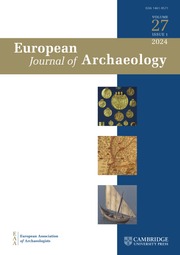Article contents
Childe, Marxism, and Knowledge
Published online by Cambridge University Press: 25 January 2017
Abstract
Childe withdrew from revolutionary politics after his post-university years in Australia in favour of a career in prehistoric archaeology in Britain. Though remaining a Marxist, his application of Marxist principles to prehistory developed only slowly as his interpretations became more sophisticated. He became increasingly interested in knowledge about prehistory from studying results of the interactions between material remains and their interpretation (in Marxist terms, the relationships between practice and theory). In his paper ‘Retrospect’, Childe (1958b:73) charted the development in his thinking to where he rejected ‘transcendental laws determining history and mechanical causes … automatically shaping its course’ with an understanding that a prehistoric society's knowledge of itself was ‘known or knowable … with its then existing material and conceptual equipment’. Thus the prehistory of Europe could be seen not as a product of Oriental civilization, but as an independent entity. Childe could then write a prehistory of Europe ‘that should be both historical and scientific’ (1958b:74). This book, The Prehistory of European Society (1958a), also demonstrated his use of the epistemology of knowledge to understand prehistory as a sociological phenomenon.
Childe renonçait aux opinions politiques révolutionnaires après ses années post-universitaires en Australie, en faveur d'une carrière en archéologie préhistorique en Grande Bretagne. Bien que toujours marxiste, son application des principes marxistes à la préhistoire ne progressait que lentement tandis que ses interprétations devenaient plus sophistiquées. l'étude des résultats des interactions entre les restes matériels et leur interprétation (en termes marxistes, les relations entre la pratique et la théorie) faisait qu'il s'intéressait de plus en plus au savoir préhistorique. Dans son article ‘Retrospect’, Childe (1958b :73) traçait le développement de sa réflexion jusqu'au moment où il rejetait ‘des lois transcendantes déterminant histoire et causes mécaniques…en formant automatiquement son cours’ avec la conception que le savoir d'une société préhistorique d'ellemême était ‘connue ou connaissable…avec le matériel existant à ce moment et l'équipement conceptuel'. Ainsi la préhistoire de l'Europe pourrait être considérée non comme un produit de la civilisation orientale, mais comme entité indépendante. Childe pouvait alors écrire une préhistoire de l'Europe ‘qui devrait être historique et scientifique en même temps’ (1958b :74). Ce livre, La Préhistoire de la Société Européenne (1958a) montrait également son usage de l'épistémologie du savoir afin de concevoir la préhistoire comme un phénomène sociologique.
Zusammenfassung
Nach seinen Nach-Universitätsjahren in Australien nahm Childe zugunsten einer Karriere in der Prähistorischen Archäologie in Großbritannien Abstand von revolutionärer Politik. Zwar blieb er Marxist, doch entwickelte sich seine Anwendung marxistischer Prinzipien auf die Vorgeschichtsforschung ebenso langsam wie seine Interpretationen immer komplexer wurden. Er interessierte sich in zunehmendem Maße für Wissen über die Vorgeschichte, das über Ergebnisse der Interaktion von materieller Kultur und deren Interpretation gewonnen wurde (in marxistischen Worten: die Beziehung zwischen Theorie und Praxis). In seinem Aufsatz Retrospect entwarf Childe die Entwicklung seiner Ansicht, in der er ablehnte, dass “transzendentale Gesetze Geschichte vorgeben und mechanische Ursachen … automatisch ihren Verlauf determinieren”; dies im Verständnis, dass das Wissen einer vorgeschichtlichen Gesellschaft von sich selbst “bekannt oder kenntlich … mit ihrem damals existierenden materiellen oder konzeptuellen Equipment” war. Demnach könnte die europäische Vorgeschichte nicht als Produkt orientalischer Zivilisation, sondern als unabhängige Erscheinung gesehen werden. Childe konnte eine Vorgeschichte Europas nachzeichnen, die″ historisch wie auch wissenschaftlich″ sein sollte. Dieses Buch, The Prehistory of European Society, zeigte auch seine Verwendung der Epistemologie des Wissens, um die Vorgeschichte als soziologisches Phänomen zu verstehen.
Keywords
- Type
- Articles
- Information
- Copyright
- Copyright © 2009 Sage Publications
References
- 1
- Cited by


